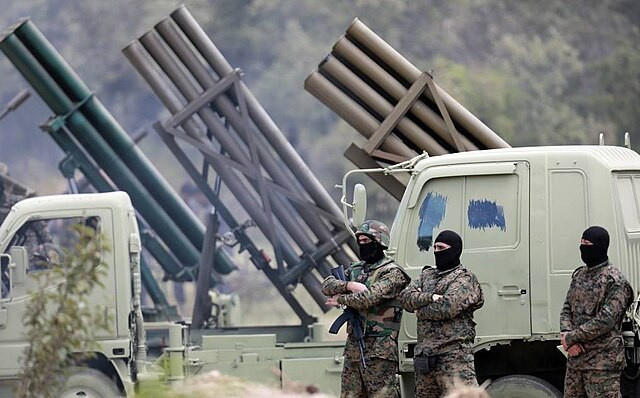Hezbollah rocket attacks on Thursday killed seven people in northern Israel, making it one of the deadliest days in recent months for civilians amid escalating hostilities between Israel and the Lebanon-based militant group. The attacks targeted agricultural areas near Metula and Haifa, underscoring the heightened threat in northern Israel as the Israel Defense Forces (IDF) intensify airstrikes against Hezbollah strongholds.
The violence began late Thursday morning when Hezbollah rockets struck an apple orchard near the border town of Metula, killing five workers. The victims, identified as agricultural laborers, included an Israeli citizen and four foreign nationals. The Israeli was named as Omer Weinstein, a member of Kibbutz Dafna, according to local authorities. One more worker was seriously injured in the incident.
In a separate attack near Haifa, two more people-described as a woman in her 60s and a man in his 30s-were killed when shrapnel struck an olive grove where they were working. The Magen David Adom rescue service identified the victims as Mina Hasson, 60, and Karmi Hasson, 21, from Shfaram, an Arab-majority city. A third individual, a man in his 70s, sustained light injuries.
In total, Hezbollah fired over 60 rockets and drones at northern Israel on Thursday, with some being intercepted by Israeli air defenses and others hitting open areas, according to the IDF. The attack prompted the local council head, David Azoulay, to criticize Israel's leadership for what he described as "normalizing the situation" in the north, implying a failure to adequately protect citizens.
The death toll from these cross-border attacks marks one of the deadliest days for Israel since fighting escalated with Hezbollah in early October. Since then, attacks have been nearly daily, prompting Israeli residents to evacuate towns near the Lebanon border amid fears of increased Hezbollah aggression in support of Gaza.
In response to Hezbollah's continued rocket attacks, the IDF conducted strikes targeting Hezbollah infrastructure deep inside Lebanon. The IDF issued warnings to residents in Lebanon's Baalbek region and surrounding areas, urging them to evacuate ahead of imminent airstrikes. The IDF also reported destroying Hezbollah weapons storage facilities and command centers in Syria's al-Qusayr region, near the Lebanese border, which has recently become a hub for storing and transferring weapons to Lebanon.
Israeli airstrikes in Lebanon have also targeted high-profile Hezbollah operatives. On Thursday, the IDF reported that an airstrike in southern Lebanon killed Muhammad Khalil Alian, the commander of Hezbollah's anti-tank guided missile unit in the Hajjar regional unit. Additionally, an Israeli drone strike killed Mustafa Ahmad Shahadi, a key commander in Hezbollah's elite Radwan Forces, near the city of Nabatieh. Shahadi was known for orchestrating numerous attacks against Israel and had previously overseen Hezbollah operations in Syria between 2012 and 2017.
"Mustafa Ahmad Shahadi advanced numerous terror attacks against the State of Israel," the IDF said in a statement, describing the elimination of Shahadi as part of broader efforts to degrade Hezbollah's capabilities along the northern border.
Meanwhile, thousands of Lebanese civilians have fled the violence, seeking refuge in nearby towns. Following the IDF warnings in Baalbek, many residents sought shelter in the nearby Christian-majority town of Deir al-Ahmar. Local official Jean Fakhry said authorities are struggling to meet the needs of the displaced population, with some forced to spend the night in their cars. "We cannot continue this way," Fakhry said, indicating the dire humanitarian conditions in the region.
Hezbollah's use of civilian areas to store and launch weapons has drawn criticism from both Israeli and international officials. The IDF has accused Hezbollah of deliberately endangering Lebanese civilians by setting up infrastructure in populated areas. According to IDF spokesperson Avichay Adraee, "You are in a combat zone where the IDF intends to attack and target Hezbollah infrastructure... and does not intend to harm you," highlighting the challenges of conducting military operations in areas with a high civilian presence.
As hostilities persist, diplomatic efforts to end the fighting are also underway. Senior U.S. envoys Amos Hochstein and Brett McGurk visited Israel for meetings with Prime Minister Benjamin Netanyahu and other officials to discuss a potential ceasefire agreement aimed at securing Israel's northern borders. Netanyahu's office reiterated that any agreement's effectiveness would rely on "Israel's determination and ability to enforce the agreement and to foil any threat to its security from Lebanon."
Israel is reportedly seeking an arrangement that would bolster United Nations Security Council Resolution 1701, which prohibits Hezbollah from maintaining a military presence south of the Litani River. According to reports from Israeli broadcaster Kan, a U.S.-drafted agreement would allow Israel the freedom to act if Hezbollah violated the ceasefire, while increasing international oversight through a newly proposed International Monitoring and Enforcement Mechanism.
The ongoing conflict has resulted in significant casualties on both sides. The IDF estimates that over 2,000 Hezbollah fighters have been killed since hostilities began, while Hezbollah has named 516 of its members who have died. In addition to Hezbollah, members of other militant groups and hundreds of civilians have also been killed in Lebanon amid the Israeli air campaign.




